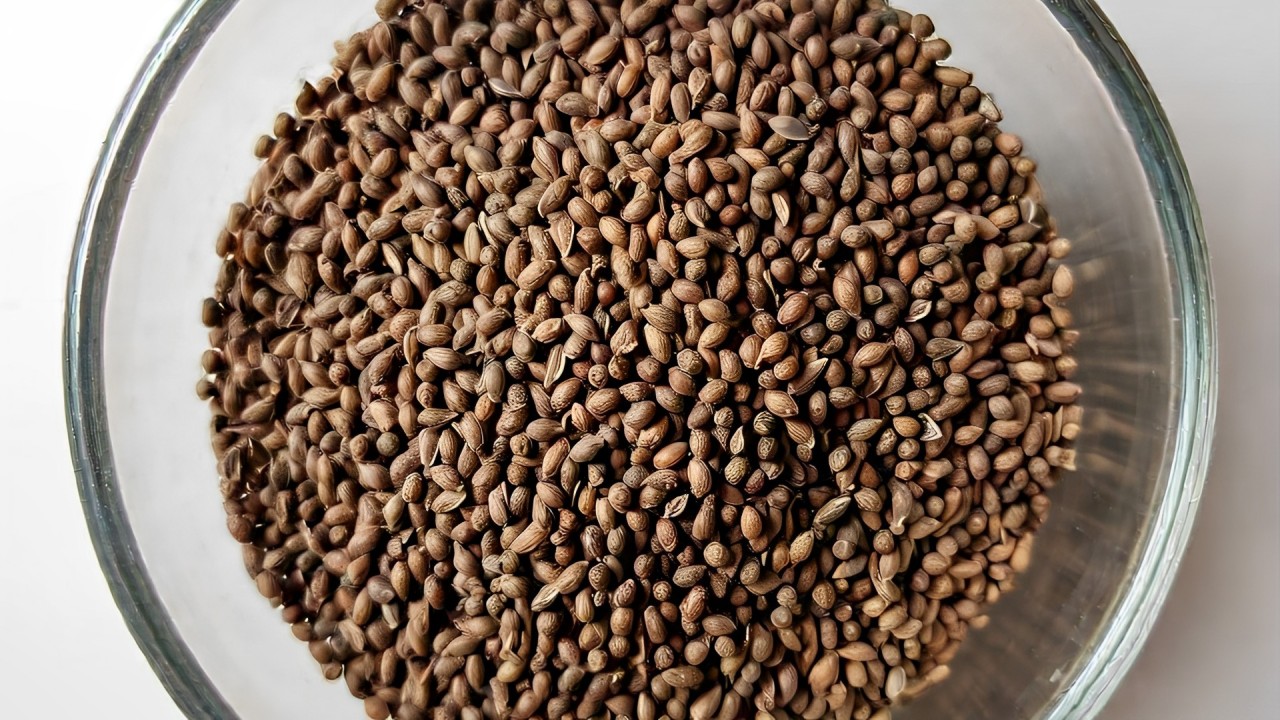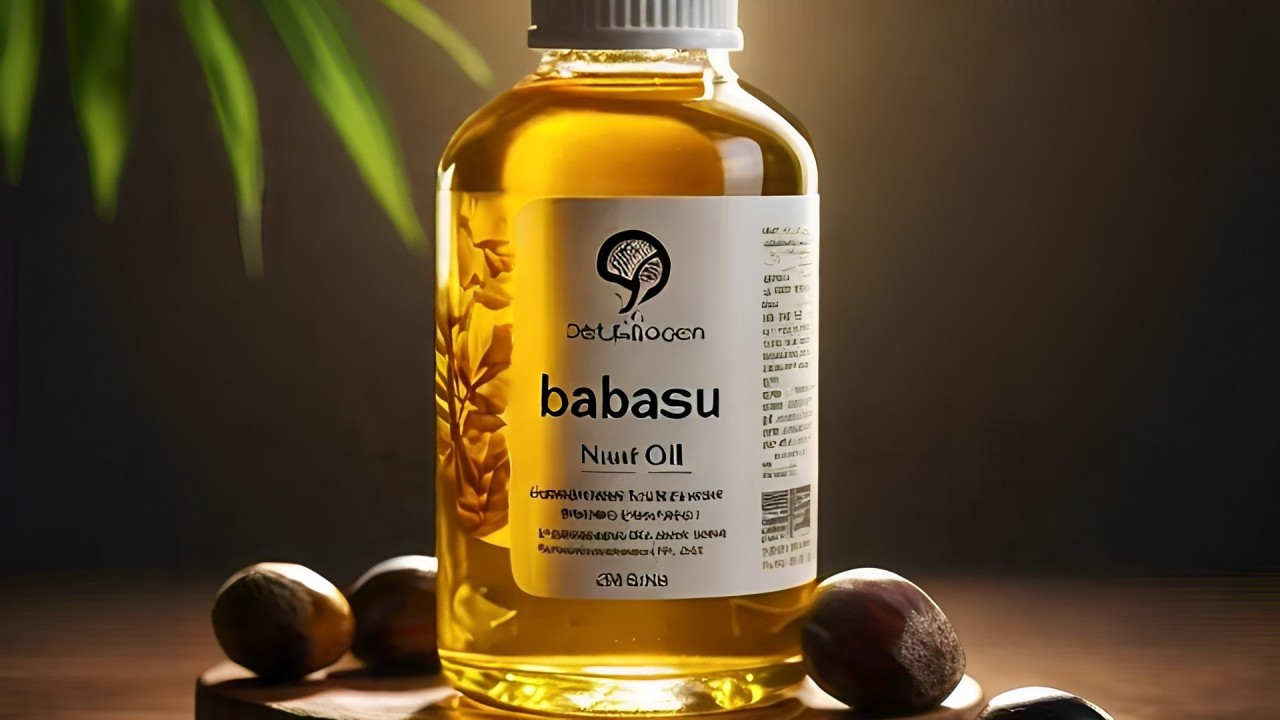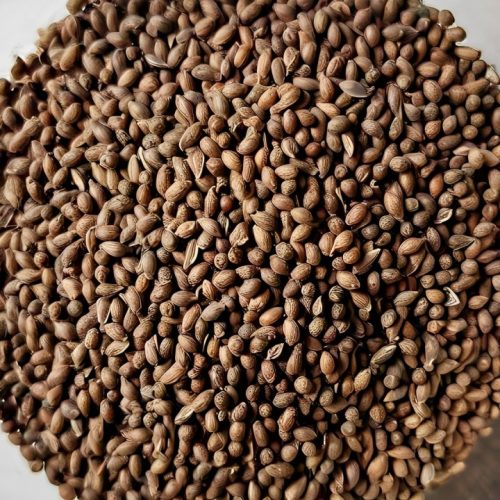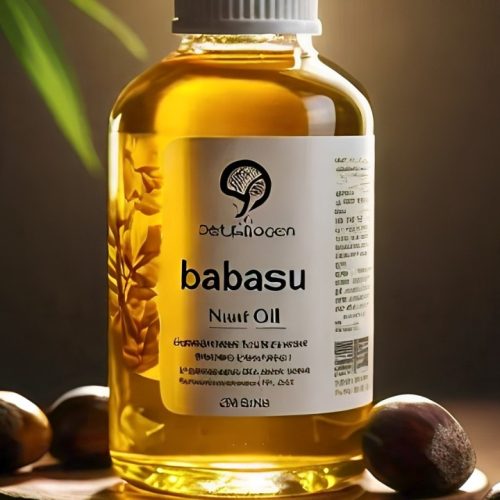Introduction
Hey guys. If you’re on the hunt for a tasty, heart-healthy superfood, bison meat might just be what you need. It’s lean, loaded with protein, and perfect for anyone focused on keeping their heart in great shape. Bison is quickly becoming a favorite for health-conscious eaters—and it’s easy to see why. Not only does it taste great, it’s also packed with nutrients that do wonders for your heart, and overall health.
Now, let’s be real, when it comes to heart health, we all want to make choices that feel good for our bodies, right? Whether you’re looking to manage your cholesterol, reduce unhealthy fats, or just find more nutritious ways to fuel your day, bison meat is a fantastic option. Not only does it pack a rich flavor and plenty of protein, it also keeps the unhealthy fats low. So you can enjoy delicious meals while making heart-smart choices. It’s a win-win for your taste buds and your health.
Have you ever wondered if there’s something else you can do to protect your heart, and keep it running smoothly? If you’re curious about how incorporating bison meat into your diet could make a positive impact, you’re in the right place. Let’s explore why bison meat is the heart-healthy superfood you didn’t even know you were missing out on. Get ready to discover its health benefits, and how it can be a delicious part of your journey to better heart health.
What Makes Bison Meat So Special?
Let’s first begin by diving into why bison meat is creating such a buzz these days. If you happen to be bored of eating the usual beef, and want to explore a leaner, healthier meat option, bison could be your new go-to. Think of bison as beef’s fitter and smarter cousin—it’s leaner, loaded with nutrients, and offers a delicious flavor that’s rich, without being too strong. So, what’s all the excitement about? You may be wondering. Well, let’s find out!
Bison vs. Beef: Leaner, Cleaner, and Healthier
First things first—let’s see how bison compares to beef. Here’s the scoop: bison meat is significantly lower in fat, calories, and higher in protein than traditional beef. On average, a 100-gram serving of bison has only about 2.4 grams of fat, while beef can pack in anywhere from 10 grams. That’s a substantial difference, especially for anyone trying to reduce saturated fats, while still enjoying red meat. And we all know that managing fat intake is crucial for heart health.
Also, bison is usually raised in a much more natural environment, which means it’s often free from the antibiotics and growth hormones commonly used in commercial beef production. This cleaner, more ethical approach to sourcing means you’re getting meat that’s not only more nutrient-dense, but also free from some of the additives that could be harmful to your health. It’s a great choice if you’re looking for quality and nutrition in your food.
Nutrient Profile: High in Protein, Rich in Vitamins and Minerals
So, what makes bison meat such a fantastic choice for heart health? Well, it all comes down to its impressive nutrient profile. Bison is rich in essential vitamins, like B12 and B6, which can help give you an energy boost, and support healthy red blood cell formation. Plus, it’s loaded with important minerals like zinc, iron, and selenium. Iron is especially noteworthy because it plays a vital role in transporting oxygen throughout your body—something we’ll dive into more later. Eating bison meat isn’t just delicious; it’s a smart move for your heart and overall well-being.
Perfect for Heart Health: Omega-3s and Low Cholesterol
Looking for more reasons to fall in love with bison? Here’s a big one: it has more omega-3 fatty acids than other red meats! Omega-3s are famous for their anti-inflammatory benefits, helping to lower the risk of cardiovascular diseases. Plus, bison meat comes with lower cholesterol levels than beef, pork, and even chicken. It’s like enjoying the satisfaction of red meat without the heart health concerns! With all these amazing benefits packed in, it’s no surprise that bison meat is becoming the go-to choice for heart-conscious eaters everywhere.
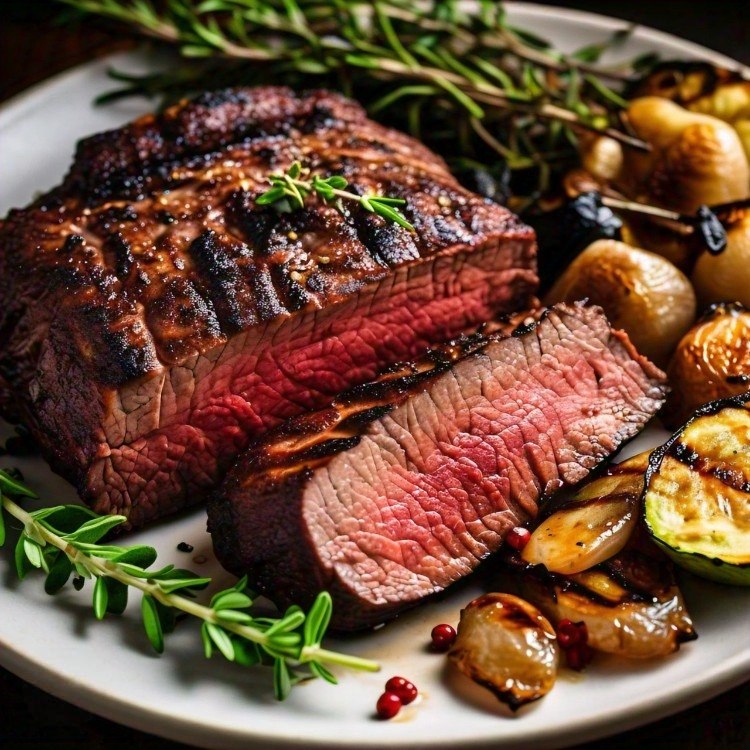
Grilled Bison meat.
Bison Meat and Heart Health
Now that we’ve covered the basics, let’s take a closer look at why bison meat is a true heart-health hero. Many foods make claims about being heart-healthy, but bison really lives up to the hype. Let’s explore how it can make a positive impact on your heart health!
Cardiovascular Benefits: Lower Cholesterol and Blood Pressure
One of the key ways bison meat supports heart health is by helping to lower bad cholesterol (LDL) levels, while boosting good cholesterol (HDL) levels. A study published in the National Library of Medicine, found that bison meat has significantly lower fat and cholesterol content than beef. What this also means is that its low fat and cholesterol content positively impacts lipid profiles, which are essential for managing cholesterol. So, by swapping higher-fat meats for bison, you could greatly reduce your risk of developing heart disease. It’s a simple change that can make a real difference for your heart.
On top of that, bison meat is a great source of potassium, an essential mineral that helps regulate blood pressure. By supporting healthy blood pressure levels, bison can play a role in preventing hypertension, which is a major risk factor for heart-related issues. It’s like getting a two-for-one deal for your heart health.
Rich in Antioxidants: Boost Heart Function and Reduce Inflammation
Bison meat is also loaded with antioxidants, which are crucial for reducing inflammation—a big deal for heart health. Chronic inflammation is a major contributor to heart disease, and antioxidants help by neutralizing free radicals, protecting your heart and arteries from oxidative stress. Studies suggest that bison meat is a rich source of beta-carotene, an antioxidant which can help strengthen heart function and also reduce oxidized LDL uptake. It’s like giving your heart a protective shield.
Iron and Heart Function: Oxygen Flow Like Never Before
Remember that mention of iron from earlier? Well, here’s where it gets really exciting! Bison meat is an excellent source of heme iron, the type of iron that your body absorbs most effectively. Iron is essential for producing hemoglobin, the protein in red blood cells that carries oxygen to your tissues. When your body doesn’t get enough oxygen, your heart has to work overtime. By adding bison meat to your diet, you give your iron levels a nice boost, making it easier for your body to transport oxygen, and keeping your heart in great shape.
Lean Protein for Weight Management
Whether you’re aiming to shed a few pounds, or simply maintain a healthy weight, bison meat can be a real game-changer. Its lean profile and high protein content makes it a perfect choice for anyone looking to slim down without sacrificing muscle mass, or feeling deprived. You can enjoy tasty meals with bison meat, while still reaching your health goals.
Perfect for Weight-Conscious Diets: Fewer Calories, More Protein
When it comes to red meats, bison stands out with fewer calories and less fat—but it definitely doesn’t compromise on its flavor. For instance, a 3-ounce serving of bison meat contains about 152 calories, while the same amount of beef can roughly deliver 214 calories. That means you get more flavor for your calorie count! Plus, with its high protein content, bison helps you feel fuller for longer, making it easier for you to steer clear of overeating, or unhealthy snacking. It’s a win-win for your taste buds and your waistline.
Supports Muscle Growth and Repair: Ideal for Active Individuals
Protein is very important for building and repairing muscles, and bison meat delivers it in abundance. Active individuals, especially those involved in strength training or endurance sports, will benefit from including bison meat into their diet. It serves as a fantastic post-workout recovery food that helps repair muscle tissue and supports growth without adding extra fat. Enjoying bison meat after a workout means you’re fueling your body the right way.
Filling and Satisfying: Curb Cravings Like a Pro
One of the hardest parts of sticking to a healthy diet is fighting off those pesky cravings, right? Luckily, bison’s high protein content can help stabilize your blood sugar levels, which in turn, leads to fewer spikes and crashes that often lead to those cruel hunger pangs. The end result? You feel more satisfied, and less tempted to grab unhealthy snacks between meals. Bison meat is a filling, protein-packed addition to your diet that helps keep those cravings in check.
How Bison Meat Stacks Up Against Other Proteins
You might be asking yourself, “How does bison meat stack up against other popular proteins like chicken, turkey, or fish?” That’s a great question! Let’s take a closer look and see how they compare.
Bison vs. Chicken, Turkey, and Fish
When it comes to calories and fat, bison meat might be on par with poultry like chicken and turkey. However, what really sets bison apart is its nutrient density. It has an impressive level of vitamins and minerals, possibly more than these lean meats, plus it has a richer flavor. It’s also less likely to be raised in industrial farming conditions, or contain antibiotics, making it a cleaner, healthier choice overall.
Now, when comparing it to fish, bison meat shines with its higher iron and protein content, offering a more balanced source of nutrition—especially for those looking to cut back on meat, without missing out on essential nutrients. While fish gets a lot of praise for its omega-3s, bison meat still stands out as one of the few red meats that also provides a respectable amount of these heart-healthy fats. So, you really can have the best of both worlds.
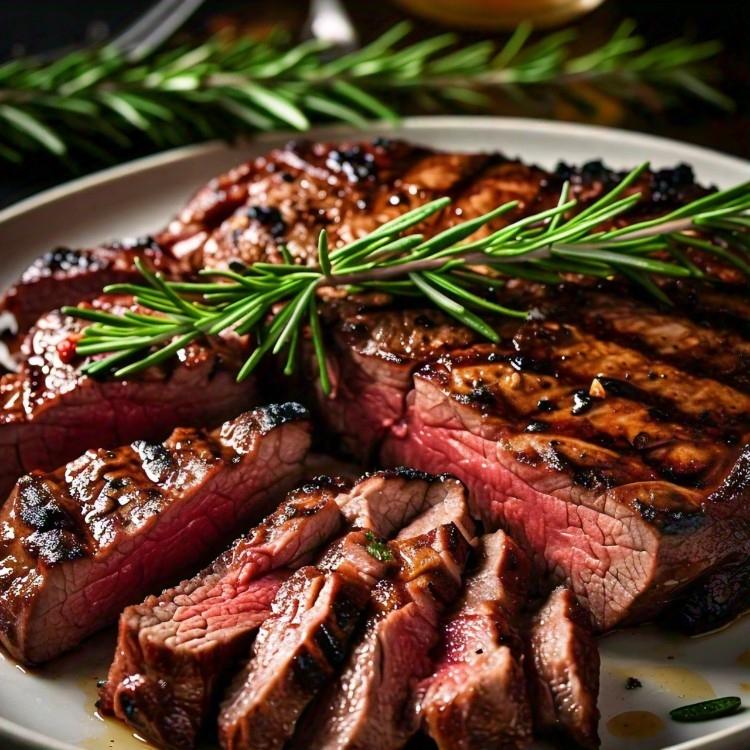
Grilled Bison meat.
Sustainable and Ethical Sourcing: A Cleaner, Environmentally Friendly Choice
Choosing bison meat over traditional beef can have a surprisingly positive impact, both on your health and the environment. Bison are typically raised on open pastures, where they graze on natural grasses and forages, which makes their farming method far more sustainable than conventional cattle farming. Unlike industrialized operations, bison farming aligns more with nature, supporting the preservation of grasslands and the overall health of ecosystems. By maintaining these grasslands, bison farming helps prevent soil erosion, promotes biodiversity, and even contributes to carbon sequestration.
So, when you pick bison meat, you’re opting for a meat source that’s lean and nutrient-dense, while also supporting a more earth-friendly way of farming. It’s a win-win for both your plate and the planet!
Tasty Ways to Add Bison Meat to Your Diet
Absolutely, let’s dive into some tasty ways to cook with bison meat! Its rich, slightly sweet flavor makes it a great substitute in many beef recipes. Here are a few ideas to kick things off:
Bison Burgers: Juicy and packed with flavor, bison burgers are a fantastic alternative to beef patties. Try seasoning with salt, pepper, garlic powder, and a bit of smoked paprika for a smoky twist. Cook to medium-rare for the best texture and taste.
Bison Chili: Warm yourself up with a hearty bowl of bison chili! Use ground bison along with beans, tomatoes, onions, and your favorite chili spices. It’s a leaner take on the classic, but still super satisfying.
Bison Steaks: Bison ribeye or sirloin steaks are delicious when simply seasoned with salt and pepper, then seared in a hot skillet or on the grill. Cook them to medium-rare to keep them tender, and serve with roasted veggies or a fresh salad.
Bison Meatballs: Swap out ground beef with ground bison in your meatball recipe. Mix with breadcrumbs, egg, garlic, and Italian herbs, then bake until golden. Serve with your favorite marinara sauce and pasta or zucchini noodles.
Bison Tacos: Give taco night a twist by using ground bison. Sauté it with onion, garlic, cumin, and chili powder, then spoon it into warm tortillas. Top it with fresh avocado, salsa, and a squeeze of lime.
Bison’s versatility makes it very easy to experiment with. Give one of these recipes a try, and you might discover a new favorite dish.
How to Cook Bison Meat: Tips for Tenderness and Flavor
Bison meat is a lot leaner than beef, so you’ll want to be careful not to overcook it. The key is to keep the heat a bit lower and take your time while cooking, so it stays nice and tender. Whether you’re grilling, pan-searing, or using a slow cooker, a slower, gentler approach will really help preserve its flavor and juiciness.
Where to Buy Quality Bison Meat
You can find bison meat at local farmers’ markets, specialty shops, or even order it from online retailers. Just try to look for places that offer grass-fed and hormone-free bison, to make sure you’re getting the best quality meat possible.
Who Should Consider Adding Bison to Their Diet?
Bison meat is a great choice, if you’re looking to boost your heart health, or simply prefer a healthier option when it comes to red meat. It’s particularly good for:
People with heart conditions or high cholesterol: The low-fat, high-protein content is perfect for maintaining a heart-healthy diet.
Athletes and fitness enthusiasts: Bison’s rich protein content supports muscle growth and recovery.
Individuals with beef allergies or sensitivities: Bison is a great alternative for those who can’t tolerate beef but still crave red meat.
Conclusion
So, as you can see, bison meat is the heart-healthy, lean, and seriously tasty superfood your diet has been missing. It’s low in fat, packed with protein, and loaded with omega-3s and essential vitamins. If you’re looking to keep your heart happy, while still enjoying rich, flavorful meals, bison meat is a fantastic option. It’s a healthier choice compared to traditional red meats, making it easier and simple to manage cholesterol, blood pressure, and even your weight. And the best part? It’s not just good for you—it’s also super satisfying, and incredibly versatile in the kitchen.
So, why not give bison meat a try? Whether you’re grilling up some juicy bison burgers, slow-cooking a comforting bison chili, or digging into a perfectly seared bison steak, you’ll probably fall in love with this protein powerhouse. Ready to make the switch? Share your favorite bison dishes with friends and family—you might just inspire them to hop on the bison bandwagon too.
And don’t forget, while bison meat can be a fantastic addition to a heart-healthy lifestyle, it’s always a good idea to check in with a healthcare professional first, before making any big changes to your diet. Everyone’s health journey is unique, so it’s important to make choices that work best for you! On that note, here’s to a happy eating experience, a heart full of health—and some really delicious meals!


